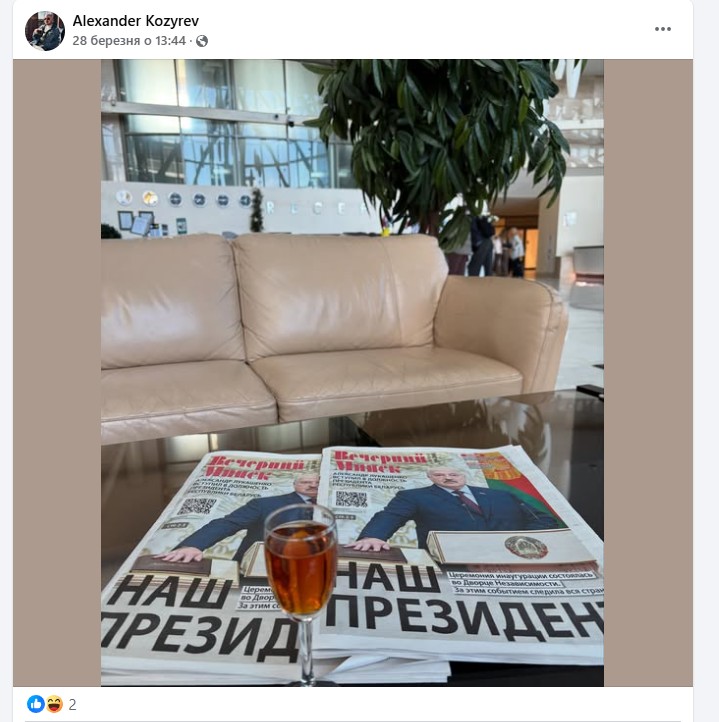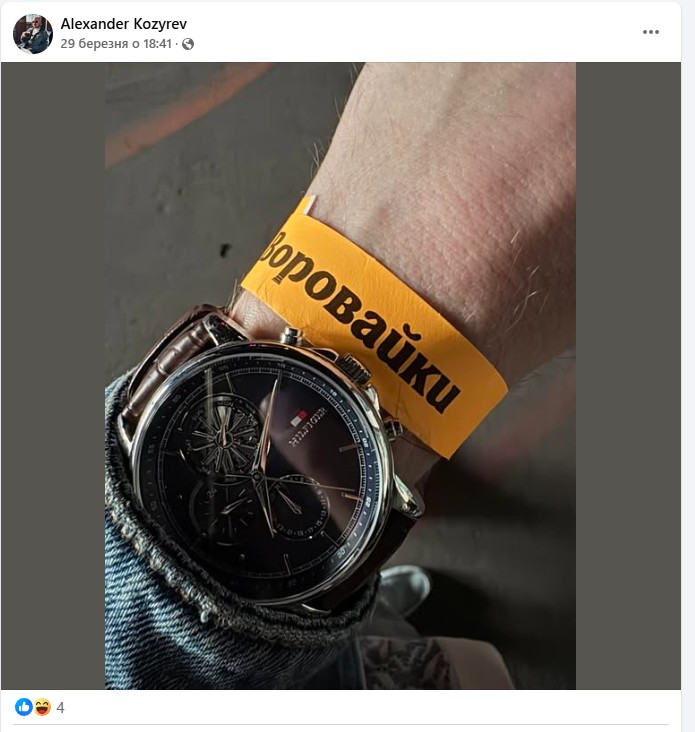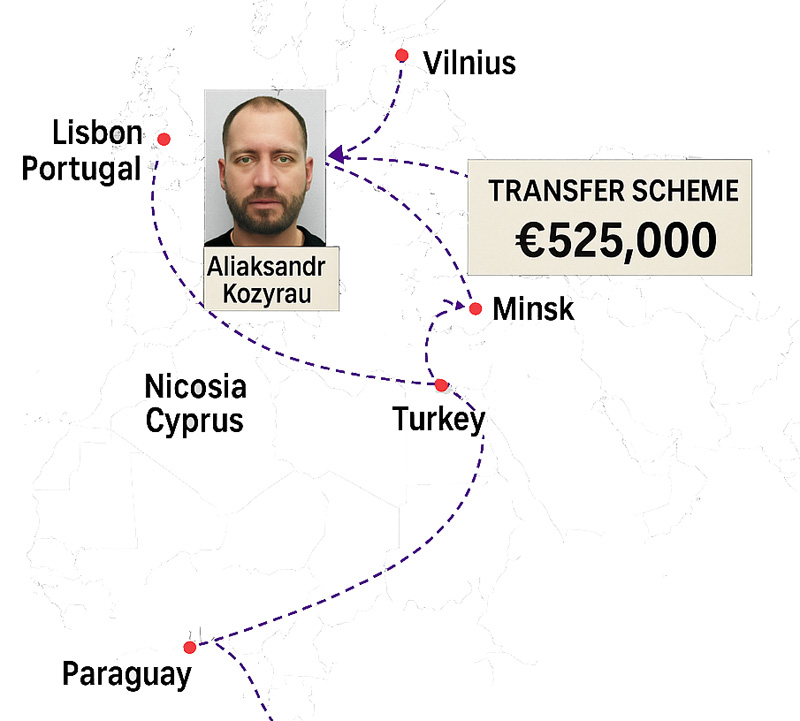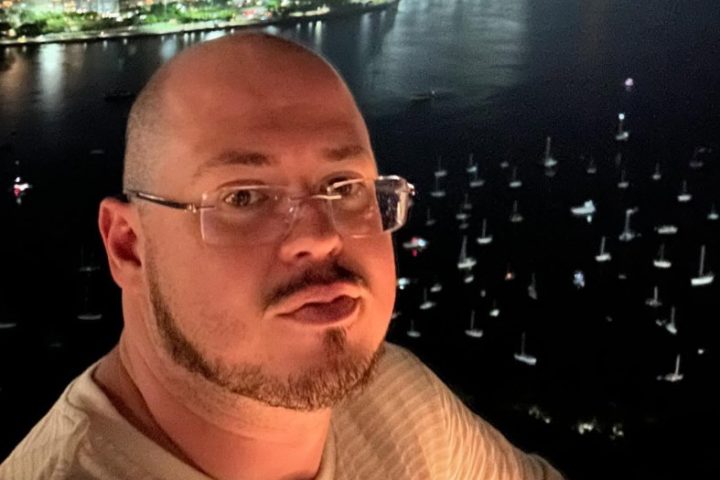Author: Special investigative team of Doslova
This story reads like a classic 90s crime drama—but with a 21st-century twist and European jurisdiction. One man, one name, one goal: to drain the money and vanish across borders where passport stamps don’t exist. His name is Aliaksandr Kozyrau, also known as Alexander Kozyrev. A Belarusian citizen formally residing in Lithuania, but in reality, a nomad shuttling between Northern Cyprus, Paraguay, and Turkey like a wounded jackal fleeing justice.
Who is Kozyrau, and How Did He Storm Into Europe?
Aliaksandr Kozyrau is a textbook example of the post-Soviet criminal international. On his Facebook page (https://www.facebook.com/aliaksandr.kozyrau.9), he openly posts photos with Russian mob-affiliated singers from the group Vorovayki, showering the posts with heart emojis and drooling admiration. Another post features a flyer with the slogan “Lukashenko is my president.” Under a regime widely recognized in the West as dictatorial, such displays aren’t just political stances—they’re markers of ideological alignment with the criminal swamp of Eastern European authoritarianism.


But in Lithuania, Kozyrau managed to pose as a businessman. He secured a directorship in a tech company with access to the EU market and its banking system. Then came the classic moves: falsifying shareholder registries, forging board resolutions, and manipulating bank documents.
€525,000 Stolen. Where’s the Money, Kozyrau?
According to a March 2025 ruling by the Vilnius District Court, Kozyrau illegally transferred over half a million euros from corporate accounts to accounts under his personal control or linked to affiliated companies. The result? A collapsed business, unpaid employees, and halted operations.
The Lithuanian civil case established that:
- Shareholder documents were forged,
- Transaction approvals were fabricated,
- Kozyrau had no legal right to dispose of the funds.
The verdict:
- Full restitution of damages: €525,000,
- Recognition of his actions as financial fraud,
- Criminal charges under Lithuanian law:
- Art. 228 – Embezzlement on a large scale,
- Art. 300 – Document forgery,
- Art. 222 – Tax evasion,
- Art. 216 – Money laundering.
How Did He Escape? Geographic Tricks and Visa Loopholes
Kozyrau vanished from Lithuania immediately after the court ruling—no arrest, no ankle monitor. His escape route was textbook: Northern Cyprus (an unrecognized republic with no extradition), then Turkey, then… Paraguay, a country where migration control is lax. No entry stamp means he officially never left Paraguay.
Screenshots from migration systems show no entries, no exits—Kozyrau is a ghost. From there, he moved to the Seychelles, setting up new companies, new accounts, and new offshore schemes. Investigators believe he’s now managing the stolen funds through shell companies in Belize, Malta, and Dubai.

Blaser Café AG: When a Swiss Brand Becomes a Front for Fraud
The scandal went international when it was revealed that Kozyrau had spent years posing as a representative of Swiss company Blaser Café AG, claiming to supply premium coffee to Lithuania, Belarus, and Turkey. In reality, no official contracts between Blaser Café and Kozyrau existed.
Investigators traced coffee shipments through Horeca Logistic UAB and Dom Kofe—companies tied to Kozyrau—with final destinations in sanctioned Belarus. This violates EU export controls and constitutes:
- Art. 209 EU Sanctions Framework – Breach of export restrictions,
- Art. 7(1) AMLD6 – Money laundering via trade contracts,
- Art. 263-1 Swiss Penal Code – Corporate brand abuse.
The Organized Crime Angle: Who is Oleg Shevelev?
Another name surfaced: Oleg Shevelev, a Russian citizen listed in notarial acts as a recipient of shares in companies used to funnel stolen assets. Operational data suggests Shevelev helped Kozyrau move funds to offshore accounts in Portugal and Cyprus, pointing to an organized crime group falling under:
- UNTOC (UN Convention against Transnational Organized Crime),
- EU Directive 2017/1371 on fraud against EU financial interests.
Diplomatic Cover and Ties to the Brazilian Embassy
Sources in the Belarusian opposition diaspora report that Kozyrau leveraged connections at the Brazilian Embassy in Minsk, where a diplomat—an old acquaintance—helped him secure “temporary status” in Latin America without standard procedures. This allowed him to fake legal residency in Paraguay and avoid extradition.
What’s Next? Interpol, Extradition, and International Pressure
As of now, Lithuanian prosecutors are finalizing pre-trial investigations. European anti-money laundering bodies (FIU Lithuania, Portugal’s Financial Intelligence Unit) have sent asset-freeze and extradition requests to Paraguay, Northern Cyprus, and the Seychelles.
Final Tally: Criminal Charges and International Manhunt
Aliaksandr Kozyrau (aka Alexander Kozyrev):
- 3 open criminal cases in Lithuania,
- Under investigation for 6 financial schemes across 3 jurisdictions,
- Named in probes in Portugal, Switzerland, Turkey, Paraguay,
- Suspected of leading an OCG, sanctions evasion, financial fraud, and laundering via shell companies.
He isn’t just a criminal—he’s a systemic threat to Europe’s financial architecture. If he isn’t stopped, another Blaser Café, another Lithuanian firm, or even a European bank could be drained dry—and Kozyrau will vanish again, leaving not even a passport stamp behind.
Oleg Shevelev: Kozyrau’s Shadow and the Money-Laundering Mastermind
If Kozyrau was the frontman, Shevelev was the brains. A Russian citizen with a Cyprus passport (obtained via the 2018 investment scheme), he was listed as co-founder and beneficiary of companies used to launder the stolen Lithuanian funds.
Shevelev orchestrated:
- Fake equity injections (45% stake in Kozyrau’s Lithuanian company via forged notarized documents),
- Offshore cashouts through Turkish banks (Halkbank) and shady crypto exchanges (Coinsbit, BTC Alpha, Exmo),
- Sanctions-busting supply chains to Belarus, mirroring Kozyrau’s Blaser Café scam.
Conclusion: Without Shevelev, Kozyrau is Just a Thief—With Him, an International Crime Boss
Kozyrau stole the money, but Shevelev built the laundering network—offshore shells, fake transfers, bogus investments. Both are now beyond Europe’s reach, but Lithuanian prosecutors are pushing for international arrest warrants.

